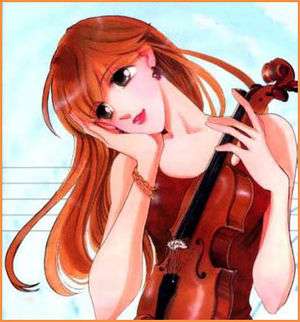Kanon (manga)

Shoujo mangaka Chiho Saito is best known as the creator of the manga versions of Revolutionary Girl Utena. This series, Kanon, is her next best known work, having won the 42nd Shogakukan Manga Award for shoujo in 1997; in fact, it's part of what influenced Utena director Kunihiko Ikuhara to invite Saito-sensei to join Be-PaPas. It predates and foreshadows many of the themes and trends in Utena, sometimes to the point where one wonders if certain ideas and scenes from Kanon were simply recycled in order to make whole segments of the famous shoujo mindscrew.
Kanon Hayashi is an 18-year-old Japanese girl with a wild, freedom-loving spirit, who has an amazing talent for playing the violin. She lives in Mongolia with her mother. The two have lived there, a simple life among shepherds, for as long as Kanon can remember.
Kanon's sick mother dies, but leaves her the knowledge that her Japanese father is alive and is a famous musician. (She's unable to reveal his name, unfortunately.) Kanon travels to Tokyo in search of her mysterious father. She meets by chance Gen Mikami, genius composer and director of a boarding music school, who is impressed by Kanon's gift for music. He decides to help her find her father and teach her violin to bring her talent out. Kanon eventually falls in love with handsome 30-something Mikami, and he returns her feelings. They start a torrid romantic/sexual affair...
... and then, in a twist that shows well Saito's love for breaking taboos, they find that Mikami is actually Kanon's father.
Kanon was serialised in Shogakukan's "Petit Comic" magazine from 1995 to 1997, and was collected into six paper volumes for its initial release and three volumes for its later bunko rerelease. The series was translated and published with great success in several countries, including Italy, France and Spain, but has never had an official English-language release.
Absolutely not to be confused with the other Kanon, a seinen visual novel and anime.[1]
- Aoyama Panel Judge: Because of the result of the "17th Piano Competition in Memory of Aoyama". This is the manga that made the words "in memory of Aoyama" a common expression among shoujo fans.
- Backstory: Most of the cast.
- Bishonen: Lots of them.
- Chick Magnet: Gen, who is also something of a playboy.
- Child Prodigy: Kanon.
- Conveniently an Orphan: Kanon's mom dies, setting everything in motion.
- Depraved Homosexual: Sachio Kajiwara comes close.
- Distant Finale.
- Flower Motifs: Including gratuitious roses during at least one performance.
- Harmless Villain: Kajiwara and his cronies.
- Hopeless Suitor: Tendou Kawahara for Kanon.
- I Want My Beloved to Be Happy: Kawahara in the end.
- Loophole Abuse: No rule says a newbie can't join a high-level music competition, or so it would seem.
- Love Bubbles: Typical in a shoujo manga.
- Mysterious Parent: Kanon's dad.
- No Export for You: Well, not for English-speaking audiences, anyway.
- Opposites Attract: Gen and Kanon.
- Parental Abandonment: Subverted. They all think Kanon's father abandoned her family; in the end they find it wasn't like that.
- Parental Incest: Gen and Kanon.
- The Rival: Tendou Kawahara feels this way toward Gen. They eventually become romantic rivals as well.
- Serious Business: Music!
- Slap Slap Kiss: Gen and Kanon, a lot.
- Invisible to Gaydar: Kajiwara.
- Stereotype Gay: Kajiwara's boyfriend.
- Surprise Incest
- Teen Genius: Kanon is a natural-born genius when it comes to music.
- Time to Unlock More True Potential: Happens a couple of times with Kanon's musical skill. Especially true when she turns out to be, not only a violin prodigy, but a piano genius as well.
- Tsundere: Gen frequently acts as a male version.
- Twin Switch / Dead Person Impersonation: Sawa.
- Two-Teacher School: Gen's academy — which, since we are on the subject, is in many ways surprisingly similar to Ohtori Gakuen in Utena.
- Unwanted Harem: Kanon has several men competing for her.
- ↑ If it helps, the two are written differently in Japanese. Seinen Kanon is カノン (in katakana), whereas this Kanon is 花音 (in kanji, being as it's the main character's name).